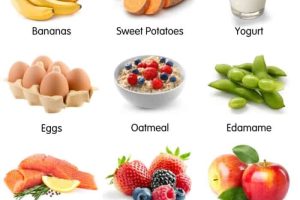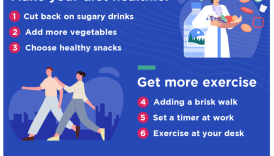Maximize Your Energy Levels with the Right Foods in Your Healthy Living Diet

Importance of Energy Levels in Healthy Living
The energy levels one maintains throughout the day can significantly impact both physical and mental well-being. People often underestimate how pivotal energy is to enable them to perform daily tasks, enjoy leisure activities, and engage in social relations. Imagine waking up, feeling refreshed and ready to embrace the day versus struggling to lift your head off the pillow. The difference is not just motivational; it’s essential for leading a fulfilling life.
- Maximize Your Energy Levels with the Right Foods in Your Healthy Living Diet
- Importance of Energy Levels in Healthy Living
- Role of Nutrition in Boosting Energy
- Understanding Macronutrients
- Carbohydrates for Sustainable Energy
- Protein for Stamina and Muscle Repair
- Incorporating Superfoods for Energy
- Leafy Greens and Berries for Antioxidants
- Nuts and Seeds for Essential Fatty Acids
- Hydration for Optimal Energy
- Benefits of Water for Energy Production
- Electrolyte-rich Beverages for Rehydration
- Meal Planning for Sustained Energy
- Balanced Meals vs. Snacking for Energy Levels
- Pre-Workout and Post-Workout Nutrition Strategies
- The Impact of Caffeine and Sugar on Energy Levels
- Caffeine as a Temporary Energy Boost
- Effects of Sugar on Blood Sugar Levels and Energy
- Gut Health and Energy Levels
- Importance of Probiotics for Digestion and Energy
- Fiber-Rich Foods for Sustaining Energy Levels
- Maintaining Energy Through Quality Sleep
- Sleep Hygiene Practices for Energy Restoration
- Impact of Sleep Deprivation on Energy Levels
- Managing Stress for Consistent Energy Levels
- Stress-Reducing Techniques for Energy Balance
- Adrenal Health and Cortisol Regulation for Energy
- Supplements for Energy Support
- Vitamin B-complex for Energy Metabolism
- Iron and Magnesium for Energy Production
- When energy levels are high, productivity soars.
- Better focus leads to improved performance at work or school.
- Enhanced mood and motivation can create a positive feedback loop, making every task feel manageable.
Role of Nutrition in Boosting Energy
Nutrition plays a fundamental role in sustaining energy levels. Just like a car needs fuel to run efficiently, our bodies require the right nutrients for optimal performance. Without adequate nutrition, fatigue can creep in, making every task feel monumental.
- Balanced Diet: Incorporate a variety of foods rich in essential vitamins and minerals.
- Meal Timing: Eating at regular intervals can prevent energy dips and spikes.
Consider how a hearty breakfast sets the tone for a productive day; it’s all about giving your body what it needs to thrive. By choosing energy-boosting foods, individuals can tackle their days with vigor and enthusiasm.
Understanding Macronutrients
Carbohydrates for Sustainable Energy
Continuing the journey toward optimal energy, it’s essential to understand the role of macronutrients. Carbohydrates are often labeled as the primary source of energy, and for good reason. They’re like quick fuel, powering your body to engage in both physical and mental activities. Think of them as the bread and butter of your diet; they ensure you stay energized throughout the day.
- Types of Carbohydrates:
- Complex Carbs: Found in whole grains, legumes, and vegetables, these release energy slowly.
- Simple Carbs: Found in fruits and sugars, these offer quick bursts of energy.
For example, enjoying a bowl of oatmeal in the morning provides long-lasting energy, unlike a sugary pastry that might lead to a crash shortly after.
Protein for Stamina and Muscle Repair
While carbohydrates provide that immediate energy boost, protein plays an equally crucial role, especially for those who lead active lifestyles. Think of protein as the building block for muscles, helping repair and rebuild tissue after strenuous activities.
- Benefits of Protein:
- Supports muscle recovery post-exercise.
- Helps maintain muscle mass as you age.
Incorporating sources like lean meats, beans, and dairy into meals not only fuels the body but also enhances overall stamina. A well-rounded plate that includes both carbohydrates and proteins can help create a solid foundation for sustained energy, allowing for active and fulfilling days.
Incorporating Superfoods for Energy
Leafy Greens and Berries for Antioxidants
As we delve deeper into enhancing energy levels, the incorporation of superfoods becomes essential. Leafy greens and berries are prime examples of nutrient-dense foods that can supercharge your vitality.
- Leafy Greens(like spinach, kale, or swiss chard):
- Packed with vitamins A, C, and K, as well as iron, they support overall energy production.
- Serve as a versatile base for salads, smoothies, or stir-fries.
- Berries(such as blueberries, strawberries, and raspberries):
- These tiny powerhouses are rich in antioxidants, helping to fight fatigue and maintain cognitive function.
- Toss them into your morning yogurt or blend them into fresh smoothies for a refreshing boost.
Imagine enjoying a vibrant smoothie filled with spinach and mixed berries; not only is it delicious, but it also fuels your body with antioxidants essential for combating tiredness.
Nuts and Seeds for Essential Fatty Acids
Next on the superfoods list are nuts and seeds, which offer a healthy dose of essential fatty acids. These little morsels are energy-dense, providing the body with sustained fuel.
- Varieties of Nuts(like almonds, walnuts, and cashews):
- Rich in protein, fiber, and healthy fats, they help keep blood sugar stable and energy consistent.
- Perfect for snacks on the go, just a small handful can make a significant difference.
- Seeds(such as chia, flaxseed, and pumpkin seeds):
- Loaded with omega-3 fatty acids and minerals, these can easily be added to smoothies or oatmeal.
Incorporating these nutrient-packed options into your diet supports energy longevity, ensuring that you remain active and engaged throughout the day.
Hydration for Optimal Energy
Benefits of Water for Energy Production
After exploring the power of superfoods, it’s time to underline another key player in the energy game: hydration. Water is often overlooked, yet it serves multiple functions in maintaining energy levels. Without adequate hydration, even the healthiest diets can fall short.
- Role of Water:
- Facilitates nutrient transport, ensuring that the macronutrients you consume reach their destinations effectively.
- Aids in thermoregulation, helping the body maintain a stable temperature during physical activity.
Consider this: When you wake up feeling sluggish, it might just be a sign of dehydration. A tall glass of water can work wonders, reviving your energy and helping you start the day on the right foot.
Electrolyte-rich Beverages for Rehydration
In addition to water, electrolyte-rich beverages can play an important role, especially after intense workouts or during hot weather. These drinks replenish important minerals lost through sweat, helping to restore energy levels quickly.
- Popular Electrolyte Sources:
- Coconut water: Naturally hydrating and packed with potassium.
- Sports drinks: Designed specifically to replenish electrolytes, but watch for added sugars.
Integrating these hydrating options into your routine can enhance recovery and keep energy levels high. So, whether it’s sipping coconut water post-gym or enjoying infused water throughout the day, hydration is a critical component of your energy management strategy.
Meal Planning for Sustained Energy
Balanced Meals vs. Snacking for Energy Levels
Continuing on the path to optimal energy management, meal planning is a cornerstone of success. Deciding between balanced meals and snacking is crucial for maintaining energy throughout the day. A well-structured meal packed with macronutrients can provide a steady stream of energy, while frequent snacks can help curb hunger without leading to overeating.
- Benefits of Balanced Meals:
- Promote sustained energy release with complex carbs, proteins, and healthy fats.
- Help regulate blood sugar levels, preventing energy crashes.
- Effective Snacking:
- Choose nutrient-dense options like fruits, nuts, or yogurt.
- Keep snacks portioned to avoid mindless eating.
For instance, having quinoa salad for lunch can keep you fueled well into the afternoon, whereas a handful of nuts can provide a quick energy boost and satisfaction between meals.
Pre-Workout and Post-Workout Nutrition Strategies
Another vital aspect of meal planning involves pre-workout and post-workout nutrition. Consuming the right foods before a workout can improve performance, while post-workout meals are essential for recovery.
- Pre-Workout Tips:
- Aim for a meal or snack that combines carbohydrates and protein about 30 minutes to an hour before exercise.
- Options like a banana with almond butter or Greek yogurt with berries work wonders.
- Post-Workout Essentials:
- Incorporate protein to aid in muscle recovery and carbs to replenish energy stores within 30 minutes after exercising.
- A smoothie with protein powder, spinach, and frozen fruit is an easy and effective choice.
By fine-tuning your meal planning strategies, you can significantly enhance your energy levels both during workouts and throughout the day, leading to improved health and vitality.
The Impact of Caffeine and Sugar on Energy Levels
Caffeine as a Temporary Energy Boost
Transitioning from meal planning, let’s explore the effects of caffeine and sugar on energy levels. Caffeine is widely known for its ability to provide a quick energy boost, often found in coffee, tea, and energy drinks. For many, a cup of coffee can act like a magic potion, shaking off fatigue and sharpening focus.
- Benefits of Caffeine:
- Enhances alertness and helps improve concentration.
- Can increase physical performance and endurance in workouts.
However, it’s important to note that while caffeine can provide that temporary lift, it can also lead to energy crashes later on. Think of that afternoon slump; many people turn to a second cup of coffee, not realizing they may be setting themselves up for a rollercoaster of energy fluctuations.
Effects of Sugar on Blood Sugar Levels and Energy
Now, let’s delve into sugar, another common energy source. Foods high in sugar can cause a quick spike in blood sugar levels, leading to a rapid boost in energy. However, that surge is often followed by a crash that can leave you feeling more fatigued than before.
- Issues with Sugar:
- High-sugar snacks can lead to energy spikes and crashes.
- Over time, excessive sugar consumption may contribute to longer-term health issues, like insulin resistance.
For instance, indulging in a sugary snack might give you a fleeting rush during a long meeting, but by the time you head back to your desk, that energy might be gone. By being mindful of your caffeine and sugar intake, you can cultivate a more stable energy level throughout the day, paving the way for increased productivity and overall well-being.
Gut Health and Energy Levels
Importance of Probiotics for Digestion and Energy
Having explored the roles of caffeine and sugar, it’s time to focus on an often-overlooked aspect of our overall health—gut health. The gut plays a critical role in energy levels, and incorporating probiotics can significantly impact digestion and, subsequently, energy production.
- Benefits of Probiotics:
- Support the growth of beneficial gut bacteria, which aids in nutrient absorption.
- Help break down food more efficiently, leading to better energy availability.
For example, enjoying a serving of yogurt or a fermented drink like kombucha can not only be delicious but also encourages a healthy digestive system, which translates to more energy during the day.
Fiber-Rich Foods for Sustaining Energy Levels
Alongside probiotics, fiber-rich foods are essential for maintaining energy levels. Fiber helps regulate digestion and keeps you feeling full longer, preventing those pesky energy crashes.
- Examples of Fiber-Rich Foods:
- Whole grains (like oats and quinoa)
- Fruits (such as apples and berries)
- Vegetables (like broccoli and carrots)
Incorporating these foods into your meals can keep you satiated and energized. Think of a hearty quinoa bowl with a variety of veggies; not only does it nourish your body, but it also provides sustained energy to keep you focused. By prioritizing gut health through probiotics and fiber, you create a strong foundation for consistent energy throughout your day.
Maintaining Energy Through Quality Sleep
Sleep Hygiene Practices for Energy Restoration
Having discussed gut health, let’s shift gears to another crucial factor in energy maintenance: quality sleep. Establishing good sleep hygiene practices is essential for energy restoration. Small changes in your bedtime routine can significantly affect how well you rest.
- Effective Sleep Hygiene Tips:
- Create a consistent sleep schedule by going to bed and waking up at the same time each day.
- Design a relaxing bedtime routine, like reading a book or practicing meditation, to signal to your body that it’s time to wind down.
- Keep your sleep environment cool, dark, and quiet to promote deeper sleep.
For instance, dimming the lights and turning off electronic devices an hour before bedtime can help prepare your mind for restful sleep.
Impact of Sleep Deprivation on Energy Levels
On the flip side, sleep deprivation can wreak havoc on energy levels, affecting both mood and performance. Missing out on sleep can leave you feeling sluggish, irritable, and unfocused.
- Consequences of Sleep Deprivation:
- Decreased cognitive function and memory retention.
- Reduced productivity and increased likelihood of mistakes.
Think of those days when you’ve skimped on sleep; tasks seem more daunting, and motivation wanes. Prioritizing quality sleep is essential in creating a cycle of positive energy that allows you to tackle each day with enthusiasm and vigor. By implementing good sleep practices and understanding the importance of rest, you set yourself on the path to sustained energy and overall well-being.
Managing Stress for Consistent Energy Levels
Stress-Reducing Techniques for Energy Balance
Now that we’ve highlighted the importance of quality sleep, let’s delve into another crucial component of sustained energy: stress management. Stress can drain energy faster than almost anything else, so finding ways to reduce it is essential for maintaining balance in our lives.
- Effective Stress-Reducing Techniques:
- Mindfulness and Meditation: Taking just a few minutes a day for mindful breathing can help clear your mind and reduce anxiety.
- Physical Activity: Whether it’s a brisk walk or a yoga class, moving your body helps release endorphins that boost your mood.
- Connect with Nature: Spending time outdoors can be rejuvenating, allowing you to escape daily stressors.
For instance, a quick lunchtime walk in a nearby park can refresh your mind and renew your energy levels, helping you tackle the rest of the workday.
Adrenal Health and Cortisol Regulation for Energy
With effective stress management techniques in place, it’s important to understand the role of adrenal health and cortisol in our energy dynamics. The adrenal glands produce cortisol, a hormone that helps regulate metabolism and stress responses—but chronic stress can lead to elevated cortisol levels, which can deplete energy over time.
- Cortisol Imbalances May Cause:
- Fatigue and burnout
- Mood swings and irritability
Prioritizing practices that lower stress and balance cortisol levels—such as consistent exercise and getting enough sleep—not only optimizes energy but also supports overall adrenal health. By cultivating a stress-resilient lifestyle, you empower yourself to maintain steady energy levels, letting you engage more fully in daily life activities and adventures.
Supplements for Energy Support
Vitamin B-complex for Energy Metabolism
As we continue our exploration of maintaining energy levels, let’s discuss supplements that can provide additional support. Among the most notable is the vitamin B-complex, a collection of essential vitamins that play a significant role in energy metabolism.
- Benefits of Vitamin B-complex:
- Helps convert food into energy, ensuring that your body efficiently utilizes the macronutrients consumed.
- Supports brain function and mood stability, which can also enhance feelings of energy.
For example, individuals often report feeling more energetic and focused after incorporating a B-complex supplement into their routine, especially during busy or stressful times.
Iron and Magnesium for Energy Production
In addition to B vitamins, iron and magnesium are vital for energy production and overall health. Iron is crucial for oxygen transport in the blood, while magnesium supports energy production at the cellular level.
- Importance of Iron:
- Prevents fatigue by ensuring that your body is oxygenated properly.
- Essential for athletes to maintain endurance during workouts.
- The Role of Magnesium:
- Helps activate the energy-producing enzymes needed for metabolism.
- Assists in muscle recovery and relaxation post-exercise.
Incorporating iron-rich foods like spinach and legumes, along with magnesium-rich options such as nuts and whole grains, can significantly boost energy levels. By complementing a balanced diet with these essential supplements, you create a supportive environment for consistent energy and overall wellness.





